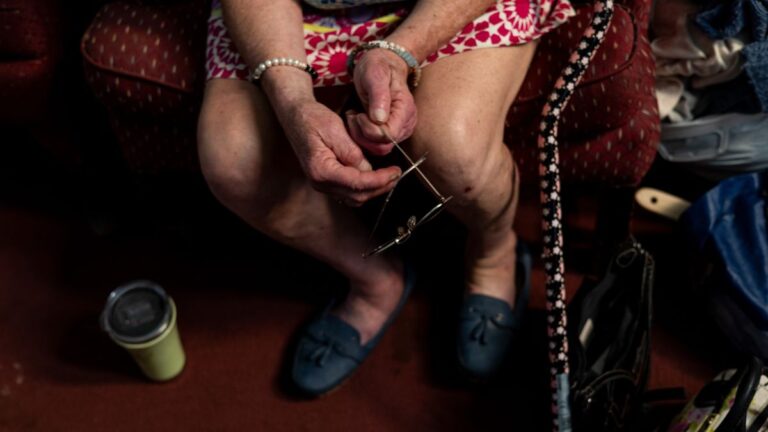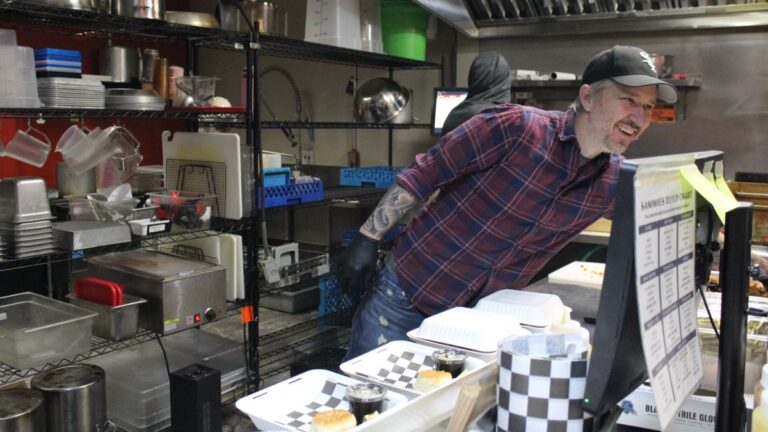LEWISTON — State Rep. Jared Golden (D-Lewiston) rubs his eyes, droopy from lack of sleep. He was up at 4 a.m. to greet workers starting their shift at Bath Iron Works.Golden tries to make it down to Bath a few times a month as he campaigns for Republican Rep. Bruce Poliquin’s seat in the U.S. House of Representatives. While the shipyard isn’t in the state’s 2nd Congressional district, many BIW workers live in district towns.
The night before, Golden was at an event in the northern part of the state, and the campaign challenges of running for office in the largest and most rural district east of the Mississippi are evident in his tired voice. “I got home at midnight last night,” he explains.
I certainly do (think) serving in the military and the Legislature were both really big ways of being involved in your community and being a part of something that I think gives you purpose.”
— State Rep. Jared Golden (D-Lewiston), candidate for Maine’s 2nd District Congressional seat
Even with the long hours and little sleep, Golden is plenty energetic when discussing issues that matter to him. Soft-spoken and almost shy, his voice packs a punch when talking about providing for opioid-addicted Mainers or the need to be pragmatic when thinking about the future of Maine’s fisheries.
Despite polling within three points of Poliquin, who has defended the seat against Democrat Emily Cain twice, Golden faces a tough battle as a progressive in one of only two districts in New England that swung for President Trump in 2016. He shares the ballot with Poliquin and two independents, Tiffany Bond and Will Hoar, who are polling at a combined 3%.
The race, the first statewide test of ranked-choice voting for federal office, is being closely watched, as it represents an opportunity for Democrats to potentially take back the House for the first time in eight years.
“This isn’t the surest shot, but Democrats clearly have a shot at this district,” says government professor L. Sandy Maisel, who chairs the Colby College political science department. “Golden has raised enough money. (Poliquin has too), but if an incumbent has to raise a lot of money, it’s a sign he’s in trouble.”
A history of service
Despite his reserved ways, Golden isn’t one to back down from a challenge. That trait has helped him navigate a path that has taken him from his hometown of Leeds to places like the Middle East and Washington, where he hopes to end up again. Looking at what’s brought him to this point, it’s easy to understand why he seems at home in this campaign.
READ MORE CANDIDATE PROFILES
After leaving the University of Maine at Farmington in 2002 to join the Marines (where he served in Iraq and Afghanistan), Golden returned home and worked in a mechanic’s shop and at a pizzeria before getting a degree from Bates College. From there, he returned to the Middle East twice – as a volunteer teacher through Bates College and then to work for Freight Forwarding, a logistics company before he landed a job as an aide to Republican U.S. Sen. Susan Collins.
He started working for the Maine Democratic Party as a staffer, and then in 2014 he was tapped to fill a last-minute vacancy and won a seat representing Lewiston in the Maine House of Representatives. He lives in Lewiston with his wife, former Lewiston city councilor Isobel Golden..
“I certainly do (think) serving in the military and the Legislature were both really big ways of being involved in your community and being a part of something that I think gives you purpose,” said Golden.
While in the Legislature, Golden distinguished himself as a nonpartisan team player and, in the process, made friends with an unlikely future ally.
“I worked hard on the Poliquin campaign two years ago,” said State Sen. Tom Saviello (R-Franklin). This year he’s crossed party lines to campaign for Golden after the two legislators worked closely on a labor bill in Augusta.
“At the end of the day, we couldn’t come to an agreement, but we shook hands and said we really gave it a try,” said Saviello. “I joked with him and I said how come you’re not a Republican? I knew he was a Democrat, but I was so impressed with his presence.”
That kind of presence is an asset for Golden in a race against a candidate with both a longer resume and an incumbency behind him. Can this 36-year-old representative successfully overtake a two-term congressman in a district where the incumbent has not been unseated in over a hundred years?
… I said how come you’re not a Republican? I knew he was a Democrat, but I was so impressed with his presence.”
— State Sen. Tom Saviello (R-Franklin)
“The Red Sox went a long time without a championship, too,” said Mike Tipping, communications director for the progressive Maine People’s Alliance. He describes Golden as a steady hand who connects deeply with the people he meets and has carried himself through a remarkable range of environments.
“I don’t know what prepares him best, working in the Legislature, or working for Collins, or being in combat,” said Tipping.
Saviello agrees. “When Bruce Poliquin gets into tough times, what does he do? He runs to the ladies room? Jared gets to tough times, he runs into fire.”
But the executive director of Maine’s Republican Party, Jason Savage, has doubts. He cautions that Golden’s progressive record will put him at odds with many in the 2nd District.
“San Francisco has enough votes in Washington already,” he says, referring to staunch and outspoken progressive Democrat Nancy Pelosi of California. Savage also says that some of what Golden puts out there is for show only. For example, he says, Golden may say he supports conservative causes like preserving the Second Amendment, but “he’s got a D rating from the NRA.”
Q&A with Jared Golden
What has inspired you to serve?
Jared Golden: I went to the University of Maine Farmington and, of course, 9/11 happened (during the) first few weeks, and I was very moved by that. I have this really strong memory of the State of the Union Address that next January … or February … in 2002, listening to the president and really thinking I should join. So I left the university and joined the Marines and did four years in the infantry – went to Afghanistan and Iraq.
I wanted to be a high school history teacher. That’s what I was doing at UMaine Farmington before I joined the Marines. That’s a public service kind of job, being a schoolteacher. I went back to Afghanistan as a volunteer schoolteacher when I was at Colby College. When I left Bates, I went to work for Freight Forwarding, a logistics firm, and was back over in Afghanistan and Iraq working for them. After doing that for a pretty short period of time, I just realized I’d spent a lot of my twenties in the Middle East and kind of wanted to be home and start putting some roots down and get a little stability in life. I started sending my resume all around to everyone I could think of, and Susan Collins’ office called me back. So I got a job in politics.
Were you a Democrat when you applied to work with her?
Golden: Oh yeah, you know, I was 18 when I enrolled to vote as a Democrat. I grew up in, I like to say, a Kennedy household. My father is kind of a hardcore Democrat, and my mother’s not a very political person. I wasn’t either. Even when I went to work for Susan Collins, I went to work for her on the Homeland Security Committee staff. These aren’t partisan-like issues. That was my introduction to American politics. I spent two years down in Washington with (Collins) and I wanted to get back to Maine.
The Democrats hired me to go work up in the statehouse in 2013 as a legislative aide. A local (politician) here in Lewiston decided that she wasn’t going to run for re-election. (It was) very last minute, and there was a scramble to find some people to run for office. That’s how I ended up being asked to run. It was a hard decision for me to move from the staff side of things to elected side. I wanted to take my own life experience coming home and figure out how the state could play a role in helping veterans.
The 2nd District is the second-most rural congressional district in the country and is fairly politically divided. It’s a tight race: whoever wins probably won’t have a clear mandate. How do you think you can represent the people who are not going to vote for you?
Golden: I’m happy to admit that this is a very tight race and that it’s not going to be a blowout. It’s rare in Maine’s 2nd Congressional District history, I think, to see those types of blowouts. I always wonder at the idea of having some kind of mandate. I guess you could say if anyone’s ever had a mandate, I’ve had it in representing House District 16 Lewiston, where I got elected by 71 percent of the vote. I don’t think there’s any reason why someone who considers themself a progressive, or someone who considers themself like a Tea Party conservative can’t govern in a way that allows them to be representative of the needs of the entire community, including people that didn’t vote for them.
I think it is perfectly OK to have differences with people. It’s how you go down into a place like Congress and choose to work with people. You either refuse to or you do accept compromise, which I think is what our political system is kind of built to encourage, but we’re moving away from that. So to me, it’s that polarization that is causing that very black and white, like you’re either representing Democrats or representing Republicans.
That’s not really been my experience though in four years in the Maine state Legislature, where we had (Gov.) Paul LePage who vetoes many things – which ups the threshold of votes that you need to accomplish anything. And then we had Republican control of the Senate (and a) Democrat-controlled house. And so everything I’ve done through four years has required an ability to get Republican votes. I consider myself a progressive Democrat, but I’ve passed over a dozen bills into law in my four years … and that meant I had to get Republican votes.
I like to say in politics, in this kind of an environment, you can have half a loaf or no loaf, but you’re really not going to get the entire loaf. And that’s the decision that you have to bring home to the people you represent. In my opinion people deserve half a loaf at the very least.
What challenges does District 2 face? What are its opportunities? What does its future look like for you? And what’s standing in the way?
Golden: You know one of the challenges of politics and running for office is answering questions like that. You know – short blurbs that are catchy, right? (Laughs.) I’m not good at it.
We have these demographic trends that are a serious challenge to the entire state, but in particular to Maine’s 2nd district. If you ask (the state economist) what the biggest challenge facing the state is they’ll say it’s workforce demand and the shortage that we have. That’s largely driven by the fact that we’re the oldest state by average age in the nation, and that is a trend that is deepening rather than getting better. Obviously, you can’t bring businesses to an area where there’s not enough workers. I don’t agree with the governor who says that taxes are the number one challenge. What I normally hear from business owners is it’s workforce shortages.
I see a lot of great opportunity. Something that I think I differ from my own party a little bit is I don’t really see a need to move away from the kinds of jobs and ways of making a living that we had in the past. I certainly recognize and acknowledge the obvious, which is that they need to be adapted for the future. There’s this very popular kind of viewpoint that the forest products industry is dead. I don’t think that’s true at all. I think they’re completely going through a transition phase and kind of recreating themselves.
An example of something I want to work on in Congress is I want the University of Maine to be designated as a federally certified research and development center for the natural resources-based economy. That comes with extra federal funding and more researchers and others to work there to help drive that kind of reinvention. If you go up to UMaine Orono, you can see the Composites Center (for research, education and economic development for the material sciences, manufacturing and engineering fields) up there where they’re making amazing things. That’s what I think the government’s role is: to get those new products for the future ready and in the pipeline to demonstrate to private investment why they should come in and say, hey, let’s start making this now.
How is the opioid crisis affecting District 2? What do you want to see being done at the federal level to help?
Golden: I’ve always turned to the people that work in the counseling centers and substance abuse centers to ask them what are the solutions. When you’re in the midst of a crisis, the first thing you have to ask yourself is how do we do harm reduction for those who are addicted. What does that mean? I think clean exchange of needles (is one aspect), something that Republicans have attacked me on.
And so secondly, I think the next most important thing obviously is making sure people have access to treatment. Most people have told lawmakers in Augusta that what needs to happen is Medicaid expansion because many of these people that are struggling with addiction come in, they don’t have health insurance, and can’t afford the treatment. Which means they walk away without any attempt whatsoever to get them sober.
The opiate crisis is not the kind of addiction that’s just going to be like, ‘hey pull yourself up by your bootstraps.’ People need health insurance, and so Medicaid expansion and that fight has been critically important for me as a lawmaker. This is not going anywhere until we treat the immediate healthcare needs of the current generation of people that are struggling with addiction. Once we get through that, absolutely – you want to talk about prevention? Let’s do it all day long.
To what degree do you think this race is a referendum on both parties and the current president? Do you think that has a lot to do with why your race is so close?
Golden: This is a race between me and Bruce Poliquin. You can look at any number of polls. I can think of six polls I’ve seen in the last six weeks that all have the president’s approval rating hovering somewhere between 40 and 50 percent. Bruce Poliquin is stuck right around a 42 percent approval rating. That’s not very good for an incumbent. But you know what is less popular as a whole? Congress. I think the approval rating of Congress as a full body is just ridiculously low. It is the least trustworthy major American institution in the eyes of everyday voters. And so I think it’s kind of a pox-on-all-your-houses type of thing.
Generally speaking, I don’t think (voters are) looking for a candidate who considers their job to be full-on resistance. I certainly hope that people share my sentiment that things can’t just be about opposing one president or one governor or one party. It has to be about being in search of solutions and teamwork.
You know how you wake up and you make a New Year’s resolution on January 1 and you’re six days into it and then you don’t go to the gym and a lot of people just kind of quit and that’s it? But if you really want to make that life change, you go back to the gym the next week. It means trying to hold yourself accountable day in and day out. You can’t just decry our broken, divisive politics and then consistently be a part of it.
There’s major money coming in from outside PACs this year. How comfortable are you with out-of-state money coming in on your behalf?
Golden: I’m not very comfortable with it. (Bruce Poliquin) is warning people that (U.S. House Minority Leader) Nancy Pelosi (of California) is funneling this dark money into the district. I have openly said and told Nancy Pelosi that I will not vote for her for the leadership. Meanwhile, while Bruce levels these accusations that really this is all about Nancy Pelosi in this election, Paul Ryan’s Super PAC has an office in Bangor, Maine in this district. You know who doesn’t? Nancy Pelosi. So it’s really kind of like throwing stones in a glass house.
I really strongly support saying that all types of political contributions no matter who they come from should be subject to full disclosure and subject to contribution limits. Imagine how much of a reform that would be just as a starting point to try and do something about this. My point is I can’t stop all the outside money coming into this race, and I’m not going to pretend that Bruce can either. But I will commit myself to fighting for real campaign finance reform that will try to limit the imbalance between what a corporation can give to a campaign compared to an individual, and at least bring equal transparency to who’s giving and to whom they’re giving and how they’re spending.







